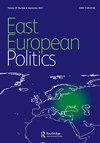The decoupling of government sentiment and the macroeconomy in a highly polarised political setting
IF 3.1
2区 社会学
Q1 AREA STUDIES
引用次数: 0
Abstract
ABSTRACT This article argues that causality between economic conditions and political sentiment can be moderated by the presence of strong political polarisation based on sociocultural issues. We look at the interdependencies between economic and political sentiment in Croatia, a country characterised by strong political divisions over interpretations of history, the role of religion in society, and conflicts of traditional vs. modernist values. Our results reveal that economic variables and government support move more or less independently. Thus, we conclude that performance evaluation in general, and economic voting in particular, play a very small role in Croatian politics.在高度两极化的政治环境下,政府情绪与宏观经济的脱钩
本文认为,基于社会文化问题的强烈政治两极分化可以缓和经济状况与政治情绪之间的因果关系。我们着眼于克罗地亚经济和政治情绪之间的相互依赖关系,这个国家的特点是对历史的解释、宗教在社会中的作用以及传统与现代价值观的冲突存在强烈的政治分歧。我们的研究结果表明,经济变量和政府支持的变动或多或少是独立的。因此,我们得出结论,一般的绩效评估,特别是经济投票,在克罗地亚政治中发挥非常小的作用。
本文章由计算机程序翻译,如有差异,请以英文原文为准。
求助全文
约1分钟内获得全文
求助全文

 求助内容:
求助内容: 应助结果提醒方式:
应助结果提醒方式:


